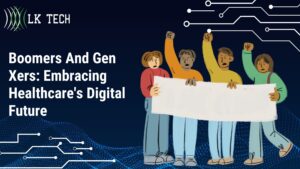How Boomers and Gen Xers Can Embrace the Digital Future of Healthcare
The healthcare industry is undergoing major technological disruption, yet many of its leaders - mostly Baby Boomers and Gen Xers - are reluctant to embrace these new innovations. This poses a paradox, as these digital immigrants find themselves steering their organizations into the digital age. To thrive in the coming decades, healthcare executives must commit to continual learning and upskilling to lead their teams into the digital future.

- Boomers And Gen Xers: Embracing Healthcare's Digital Future
The Digital Skills Gap in Healthcare Leadership
Healthcare is a massive industry, with over $4 trillion in annual spending in the United States alone. It employs over 20 million Americans across hospitals, clinics, home health services, and more. Yet its leadership ranks are dominated by digital immigrants - Boomers and Gen Xers born before 1980. Consider the average age of healthcare executives:
- The average age of healthcare CEOs is 55 years old. CFOs average 52 years old. The typical C-Suite executive is 53.
Source: AM Executive Compensation and Benefits
- In contrast, the average age of high-tech startup founders is only 40 years old, according to joint research from Harvard and Duke Universities. Millennials dominate new tech ventures, while older generations lead established healthcare institutions.
- An MIT Sloan study found that companies led by tech-forward executives are 26% more profitable on average. They also earn 9% more revenue than companies led by tech laggards.
The last of the Baby Boomer generation turns 65 in 2029, just 12 years away. And the first members of Gen Alpha, born after 2010, will come of age by 2030. The pace of digital transformation is only accelerating. To avoid disruption, healthcare executives must commit now to upskilling and leading their organizations into the future.
Upskilling for the Digital Future
To bridge the digital skills gap, healthcare leaders should:
- Seek out reverse mentors: Partner with younger, digitally-native employees to learn emerging technologies. This flips the typical dynamic of older mentoring younger.
- Pursue continuing education: Take advantage of executive courses on technology strategy and management from top business schools. Learn to evaluate innovations.
- Attend conferences and events: Stay updated on the latest healthcare technologies by networking with peers and tech providers. See innovations firsthand.
- Engage in self-directed learning: Set aside time each week to read, listen to podcasts, and watch videos on digital transformation. Make learning a habit.
- Participate in training programs: Complete structured online learning programs focused on digital skills like data analytics, AI implementation, cybersecurity, and more.
- Embrace a growth mindset: Maintain an openness to new ideas and eagerness to expand skills. Avoid a fixed mindset that resists change.
Committing to continual, lifelong learning is key for leaders to thrive amidst disruption. Rather than bemoan change, embrace emerging technologies as opportunities to transform care.
What Does the Future of Healthcare Look Like?
Leading technology analyst Thomas Frey, Google's top futurist, predicts that by 2030:
- 80% of doctor visits will be automated check-ups and exams conducted by AI and robotics. Medicine will be hyper-personalized, with treatments 3D printed on demand.
- Coding will be an essential skill for over 20% of all jobs, not just in tech roles. Adaptability and computational thinking will be crucial across industries.
Emerging technologies like AI, robotics, and 3D printing will transform medicine over the next decade. To lead in this future, executives must embrace tech not just for efficiency gains but to entirely reimagine their operations, business models, and value propositions.
Here are some key technologies that will reshape healthcare by 2030:
Telehealth and Remote Patient Monitoring
- Video visits, health wearables, and at-home diagnostic devices will enable continuous care outside hospitals and clinics.
- Remote surgery using robotics will allow top specialists to treat patients globally.
AI and Automation
- AI will automate administrative tasks, freeing up staff for higher-value work.
- Smart workflow bots will triage patients, schedule visits, process paperwork, and more.
- AI diagnosis tools will provide faster, more accurate risk assessments and readings of medical images.
Genomics and Precision Medicine
- Genetic profiling will enable truly personalized treatments tailored to patients' DNA.
- Gene editing techniques like CRISPR may cure inherited diseases by altering DNA sequences.
- Pharmacogenomics will prescribe exact medication doses based on individuals' genetics.
3D Printing
- 3D bioprinting will produce living tissue for skin grafts, organ transplants, and more.
- Drugs will be 3D printed on demand in precise doses customized for each patient.
- 3D printing will also produce medical devices matched to anatomy, like prosthetics.
Blockchain
- Secure distributed ledgers will provide privacy-preserving shared access to health records across systems.
- Blockchain will improve supply chain tracking, clinical trials management, insurance claim processing, and other workflows.
Futurists like Frey predict these technologies will drive medicine for the next generation. To ready their organizations, executives must expand their digital acumen far beyond basic computer literacy.

- Boomers And Gen Xers: Embracing Healthcare's Digital Future
An Example of Resistance to Change
Consider an obstinate doctor determined to avoid modernizing his small practice, despite mounting fines for failing to digitize records and multiple poor online reviews lamenting his outdated processes. Yet when this same doctor goes for a haircut at his local barbershop, he happily checks in online, skipping the line.
This contradiction highlights how even those reluctant to change benefit from tech-enabled conveniences daily as consumers. All the while, forward-looking competitors embrace innovations to better serve patients. The choice for leaders is clear: stop resisting change and start leading the digital future. Executives must update their skills and systems continually, rather than delaying the inevitable. They should view emerging technologies as opportunities to transform care, not threats to avoid.
Conclusion: Embrace Change Through Continual Learning
The digital revolution promises to reshape healthcare over the next decade, from AI diagnosis to 3D printed organs to blockchain-secured genomic data. Executives who embrace this change through continual learning will lead their organizations into the future. Those who resist will risk irrelevance.
With vision, urgency and commitment to upskilling, Boomers and Gen Xers can capitalize on the promise of healthcare's digital transformation, rather than be rendered obsolete by it. But they must start preparing today.
Some final principles for healthcare leaders to thrive amidst the coming changes:
- Bridge the digital skills gap between your expertise and that of younger, tech-native employees. Seek reverse mentors.
- Commit to continual learning through courses, conferences, training, and an openness to new ideas. Make learning a habit.
- Embrace emerging technologies not just for efficiency gains but to entirely reimagine your operations and business models.
- Resist the urge to delay change. Modernizing sooner improves competitiveness and patient care quality.
- Lead with vision. Paint a compelling picture of the future to motivate and direct your teams through disruption.
Healthcare is undergoing a digital revolution. With urgency, vision and commitment to upskilling, Boomers and Gen Xers can lead their organizations into this technology-driven future. The time to start preparing is now.
If you're looking for a team of IT experts in Cincinnati, Ohio, LK Technologies offers exceptional IT solutions tailored to your organization's needs. Contact us today to get a free consultation!


